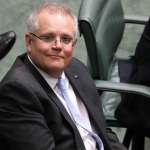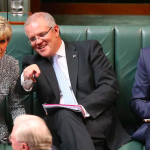The Government is Watching You, But Don’t You Dare Watch It

According to the count the UNSW Law School is keeping, successive federal governments have passed 85 pieces of counterterrorism legislation since 9/11. And currently, there are five further bills of this nature before parliament.
Numerous commentators have pointed out that while these laws have been passed ostensibly to deal with terrorists, they’re actually slowly whittling away at the rights of all Australian citizens. And these are rights that have scant protections at the federal level.
For this reason, these anti-terrorism laws have a much wider reach than similar laws in countries where rights have more adequate protections. And these laws, which have been passed with bipartisan approval, have afforded the government much greater control over our lives.
Although, this is no tit-for-tat operation. While the government has been increasingly passing terror laws that seemingly have a dual purpose of social control, it certainly doesn’t encourage the citizenry to look into its inner workings.
Indeed, while the federal government has made sure that its ability to pry into our lives has gradually been enhanced over the last two decades, it’s also ensured that any checks and balances in its direction have fallen by the wayside.
Big Canberra is watching
Of course, one of Peter Dutton’s favourite hobbies is passing rights-eroding laws. And one of the five pending pieces of terrorism-related legislation before parliament is the home affairs minister’s International Protection Orders Bill 2020.
His new bill would allow for the Australian government, and another government that it enters into an agreement with, to directly require communications providers in the other’s country to hand over the metadata or stored communications of citizens under investigation for serious crimes.
This would enable our government to obtain the information of its citizens stored overseas. And commentators have raised further concerns as to whether it would also allow foreign agents to spy on Australians on behalf of our government, where it doesn’t have the authority to domestically.
This legislation was introduced into parliament a fortnight after minister Dutton told the ABC that the government’s plan to turn the nation’s international spying agency – the Australian Signals Directorate (ASD) – on its own citizens is close to finalisation.
And this often-denied proposal to broaden the ASD’s mandate has raised questions as to why the government needs to do this as it already has the eyes of its domestic spying agency ASIO and the AFP focused upon its citizens.
Dwindling freedoms
Prior to Peter Dutton, it was then attorney general George Brandis who had a penchant for increasing government powers at the expense of citizens’ freedoms. And a prime example of this is the metadata retention regime he oversaw the establishment of.
Metadata laws were passed in 2015. And they’ve since required all telcos store their customers’ metadata for a period of two years. This information includes time and date of calls, text messages and emails, as well as their duration and their recipients.
This data may sound unimportant, but experts warn that you can actually build up a pretty good profile of an individual using it. And currently, 22 law enforcement and intelligence agencies have warrantless access to it.
Another example of the ever-creeping reach of government is Dutton’s 2018 Assistance and Access Bill. This encryption-foiling piece of legislation set up a three-tiered system that requires communications providers to allow the government to access their systems.
The bill also established a new regime of computer access warrants that allow government agents to “add, copy, delete or alter” information on a device a warrant relates to. This is the type of warrant that the AFP used during the raid of the ABC’s Sydney office last June.
Civil Liberties Australia CEO Bill Rowlings told Sydney Criminal Lawyers prior to the bill’s passing that these powers “would enable ultimate bureaucratic control over citizens”. And he further warned that as we all rely on communications devices, nothing would “be free from government prying”.
No government accountability
But, while the government has it all sorted when keeping an eye on its citizens, it’s certainly keeping its own dealings less than transparent. Unlike in NSW, there’s currently no independent oversight body to watch over federal government corruption. And this is despite long-term calls for one.
A federal ICAC (independent commission against corruption) would deal with the corrupt practices of politicians, like those that have recently been exposed in the sports rorts scandal. And indeed, a watchdog in play, may very well have prevented such corruption from happening in the first place.
However, while the Australian Greens have been consistently introducing bills over the last decade that aimed to establish an independent oversight body that would be charged with keeping an eye on federal politicians, the government has consistently knocked back these proposals.
Instead, the Morrison government promised in December 2018 that it would establish a closed-door federal integrity commission, which was widely criticised as a proposal with no teeth. And it went onto announced in January this year that it missed its own deadline for doing so.
Persecuting whistleblowers
Australian laws have long been criticised for providing inadequate whistleblower protections. And in mid-2018, the Turnbull government passed the Espionage and Foreign Interference Bill, which established draconian penalties for those blowing the whistle on government.
This legislation created the federal offence of “communicating or making available national security information to a foreign country”, which critics warned could actually see journalists sent away for life imprisonment over publishing leaked government secrets.
And the long list of whistleblowers currently awaiting trial over charges that could see them sent away for many years is well-known. There’s former military lawyer David McBride, Witness K and long-term East Timor defender Bernard Collaery, as well as former ATO employee Richard Boyle.
Federal rights protections
The chief reason that analysts give as to why the Australian government has been able to enhance its reach over the last two decades is that the nation has no federal bill of rights. In fact, this country is actually the only western democracy not to have one.
A bill of rights or a human rights act would guarantee that the rights of all Australians are protected under the law. And it would also ensure that the country’s laws and policies are consistent with human rights standards.
Once again, successive Australian governments have baulked at establishing one, which prompts the question as to why both major parties have consistently decided against legislation that would increase protections for citizens and lessen the government’s grip.
But, we’ll leave you to ponder that one.







